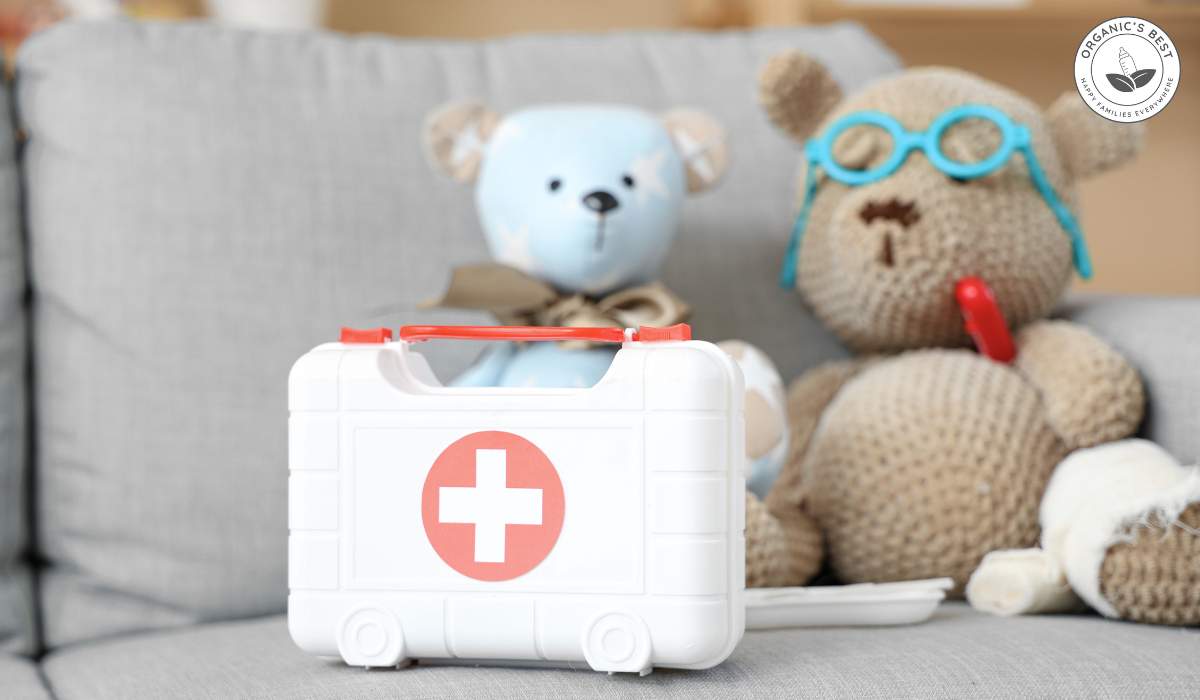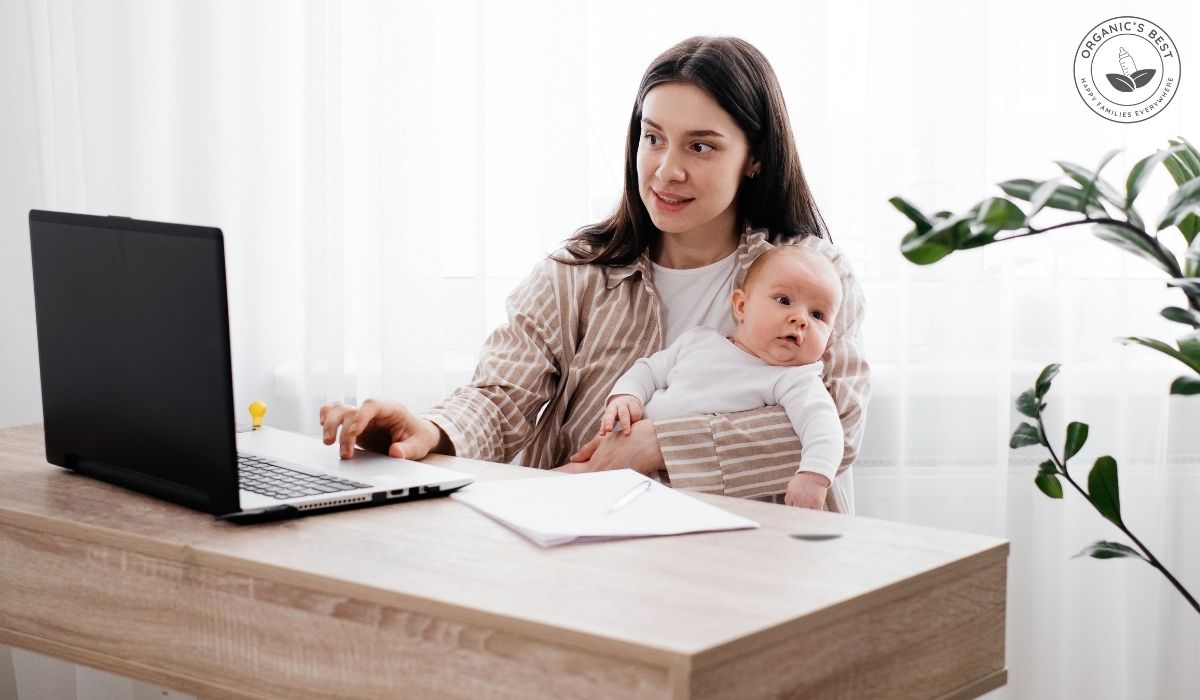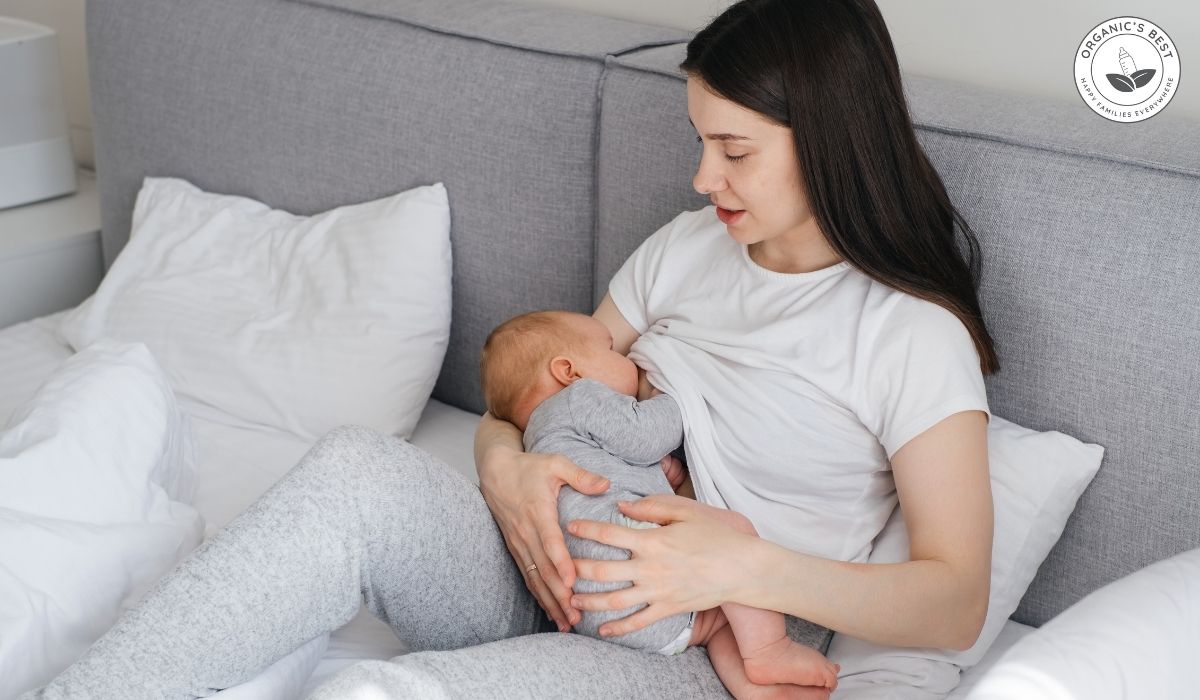Click to Get 2 FREE Boxes/Cans
Click to Get 2 FREE Boxes/Cans
Only New Customers! Click HERE to Get 2 Extra Boxes/Cans for Free With Your First Order.
Only New Customers! Click HERE to Get 2 Extra Boxes/Cans for Free With Your First Order.
BABY FORMULA
Offering new parents top-quality European infant formula from renowned brands like HiPP, Holle, Kendamil, and more. If you’re uncertain about which product to choose, our Formula Finder can help you make the best decision for your baby.
Baby Food
Offering new parents a premium selection of European baby foods, including jars, pouches, cereals, and snacks from esteemed brands like HiPP and Holle.
Why Having a Baby First Aid Kit at Home Is Important?
by Agustina Fernandez September 09, 2025 8 min read

The hustle and bustle of postpartum life can throw even the most prepared parents off balance, but that doesn't mean you can't set your future self up for success.
While you're busy prepping the nursery, packing your hospital bag, and stocking your postpartum care kit, it's also worth putting together a baby first aid kit. That way, when those first little bumps, bruises, and sniffles come along, you'll have everything you need at your fingertips instead of scrambling for supplies.
We suggest being ready for common ailments and boo-boos, like minor cuts, fevers, or colds. Especially once your baby starts crawling, because once those tiny legs get moving, scrapes, bruises, and germs aren't far behind, and you'll likely get very familiar with them during the first few years of life.
All in all, a baby first aid kit offers peace of mind, helps you handle minor mishaps with confidence, and ensures you're prepared for those everyday parenting emergencies. Below, you'll find exactly how to put one together!
Table of Contents
Common Baby Emergencies a First Aid Kit Can Help With
First things first, baby first aid kits aren't meant to replace professional medical care, but they can help you manage the everyday situations that parents encounter most often.
Here are some of the most common reasons that parents turn to their baby first aid kit.

Baby Wound Care and Cleaning
Babies are constantly learning new skills, like rolling and crawling, and with that comes the occasional tumble. Having sterile gauze, adhesive bandages, and a small tube of antibiotic ointment in your baby first aid kit allows you to clean and protect minor cuts or scrapes right away, lowering the risk of infection and keeping your little one more comfortable.
Common Colds and Congestion
Another scenario many parents face early on is congestion. Babies can't blow their own noses, and even a mild cold can leave them miserable. A nasal aspirator or bulb syringe paired with saline drops can work wonders to clear tiny nasal passages and help your baby breathe easier.
These simple tools often become a lifesaver in the middle of the night when your baby is struggling to sleep because of a stuffy nose.
Minor Illnesses and Fevers
Fever management is another area where having a baby emergency kit comes in handy. Babies can spike a fever quickly, and knowing their exact temperature is super helpful when it comes to deciding the next steps and whether a visit to the doctor is in order.
A rectal thermometer remains the most accurate option for infants, and pairing it with a medicine dropper or syringe ensures you can give precise doses of infant acetaminophen if your pediatrician recommends it. You can also help reduce your little one's fever by giving them a lukewarm bath or applying lukewarm compresses.
Having these items ready allows you to monitor your baby closely while you wait for medical advice, without scrambling to buy supplies.
Mild Skin Conditions
Skin care is also part of everyday baby first aid. From diaper rash to dry skin, babies' delicate skin often needs a little extra protection. Including items like petroleum jelly, diaper cream, and baby-safe moisturizers in your kit ensures you can soothe irritation before it becomes more uncomfortable for your baby.
What Are the Baby First Aid Kit Essentials?
When putting together your first aid kit, think about both the everyday needs and the unexpected situations. Some items might make you ask yourself, 'When am I ever going to use this?', but when it comes to baby care, it's always better to be overprepared than underprepared.
Here is a baby first aid kit checklist to get you started.

Bandages and Sterile Gauze
Even the tiniest cut or scrape can look alarming on a baby, but having bandages makes it easy to cover small wounds and keep them clean. You can include different sizes and kinds of bandages in your first aid kit to account for different scenarios.
Antibiotic Ointment
Keeping a small tube of antibiotic ointment in your first aid kit can help prevent infection in minor cuts and scrapes. A thin layer is usually all you need to keep your baby's skin protected as it heals. Always double-check with your pediatrician about which brands are safe for babies, especially in the first few months.
Saline Drops or Spray
Newborns and young infants can't blow their noses, which makes even a mild stuffy nose uncomfortable. Saline drops or sprays are safe, gentle, and effective for loosening mucus, making it easier to suction out with a nasal aspirator. They're often recommended by pediatricians as the first step in helping a congested baby breathe easier.
Nasal Aspirator/Bulb Syringe
A good aspirator is worth its weight in gold during cold season, so make sure to include it in your first aid kit. Whether you opt for a traditional bulb syringe or a "snot sucker", these tools help you clear mucus from your baby's nose so they can feed and sleep more comfortably. Many parents find themselves reaching for them often during their baby's first year.
Baby Nail Clippers and Emery Board
It's amazing how quickly those tiny fingernails grow, and how sharp they can get. Babies can easily scratch their own face or eyes, so keeping a baby-sized set of clippers or a soft emery board in your first aid kit is essential. These tools are designed for little fingers, making the process safer and easier than using adult versions.
Petroleum Jelly or Diaper Cream
Your baby's skin is delicate and prone to irritation, whether from drool, friction, or diaper rash. A tub of petroleum jelly or a tube of diaper rash cream in your baby healthcare kit can soothe irritated areas and act as a protective barrier.
Rectal Thermometer
Rectal thermometers are considered the most reliable for infants, especially those under three months old. While it might feel intimidating at first, many pediatricians recommend this method because it provides a clear, accurate reading when you need to decide whether to call the doctor.
However, after the three-month mark, you can also use an axillary (underarm) thermometer, which is less invasive and still provides a reliable measurement for babies.
Infant Acetaminophen (Tylenol)
Fever, teething pain, or general discomfort can sometimes call for infant acetaminophen. This is one medication most pediatricians will recommend keeping in your infant medicine kit, but it's critical to follow dosing instructions carefully and only administer it under your doctor's guidance.
Medicine Dropper or Dosing Syringe
Household spoons aren't safe or accurate for giving babies liquid medicine. A dosing syringe or dropper ensures that you measure the exact amount your pediatrician recommends.
Tweezers
Tweezers should be included in your baby first aid kit, as they can come in handy for removing splinters, stingers, or small pieces of debris from your baby's skin. They're also useful for handling bandages or gauze without directly touching them.
First Aid Manual
Finally, information is just as important as supplies when it comes to your baby first aid kit. A small first aid manual or quick-reference guide gives you step-by-step instructions when you're in the moment and feeling flustered.
Emergency Numbers
It's also smart to keep a list of emergency numbers tucked inside your baby first aid kit, including your pediatrician, local urgent care, and poison control. Having these numbers in one place can save precious time if an emergency arises.
Where to Keep Your Infant First Aid Kit for Easy Access
Having the right supplies is only going to work, if your baby first aid kit is quickly accessible. We suggest choosing a spot in your home where your kit is safe from curious little hands but still easy for adults to access quickly. Some parents keep a dedicated box in the bathroom or nursery, while others prefer the kitchen since it's often a central hub.
It's also a good idea to keep more than one baby first aid kit. A smaller, travel-sized version of your first aid kit tucked into your diaper bag or car can be a lifesaver when you're out and about. Babies don't wait to get home to get into mischief, and having supplies on hand while travelling, visiting family, or even just running errands can give you some extra peace of mind.
Finally, don't forget to check your baby first aid kit regularly! Medications expire, creams can dry out, and bandages lose their stickiness over time. A quick review every few months ensures that everything is fresh, safe, and ready to use when you need it most.
Tips for Using and Maintaining Your Baby Medicine Kit Safely

Once your baby first aid kit is fully stocked, it's worth taking a little time to get familiar with what's inside and how to use each item. That way, if an urgent situation comes up, you'll feel confident reaching for what you need instead of fumbling with bandages or trying to read medicine instructions for the very first time.
When you are met with a boo-boo or illness, it is also important to stay as calm as possible, or at least fake it until you make it! Babies pick up on their parents' stress, and your calm presence can help keep the situation under control while you decide what to do next.
In the chaos, remember to follow instructions carefully, especially when it comes to medications. Double-check dosages, use proper measuring tools, and when in doubt, call your pediatrician for clarification. A first aid kit gives you the tools, but your doctor provides the guidance to use them safely.
Keep reusable tools like tweezers and nasal aspirators clean by washing or sanitizing them after each use. Store everything in a sealed container or pouch to keep supplies sanitary and organized.
Most importantly, remember that a baby first aid kit is for minor issues. If your baby's condition worsens or you feel unsure, never hesitate to seek medical attention. Trusting your instincts is one of the most valuable tools you'll ever have as a parent!
Wrap Up: A First Aid Kit for Baby Gives Parents Peace of Mind
As you know, or are soon to find out, parenthood is full of surprises. Some are joyful, some are stressful, and many are somewhere in between. While you can't prevent every bump or sniffle, you can be prepared for them, so that you can show up for your child more calmly amidst the chaos of parenthood.
Your baby first aid kit should include medication, supplies, and resources, but remember, even though you'll be "playing doctor" at home, you're not actually one, which is why you should always follow dosing instructions carefully and check with your pediatrician before giving any medication, or if you have any questions about your child's ailment or injury.
|
Disclaimer: Please be aware that this information is based on general trends in babies, and it is not medical advice. Your doctor should be your first source of information and advice when considering any changes to your child’s formula and when choosing your child’s formula. Always consult your pediatrician before making any decisions about your child’s diet or if you notice any changes in your child. Breastfeeding is the best nutrition for your baby because breast milk provides your child with all the essential nutrients they need for growth and development. Please consult your pediatrician if your child requires supplemental feeding. |
Agustina Fernandez
Dr. Agustina Fernandez earned her medical degree from the prestigious Universidad Nacional de Córdoba, Argentina. With a deep-rooted passion for pediatrics, Dr. Fernandez is currently on the path to specializing in children's healthcare. Recently, she has delved into the vital field of infant nutrition. Her research interests include breastfeeding, infant formula, and baby food in little ones’ formative years. Dr. Fernandez's commitment to this area of study underscores her dedication to ensuring the health and well-being of children from their earliest days.
Leave a comment
Comments will be approved before showing up.
Also in Organic Infant Nutrition and Health Blog

10 Winter Activities for Kids and Toddlers
by Agustina Fernandez January 06, 2026 8 min read
Read More
How to Choose The Best Infant Formula: A Guide to EU Organic Formulas
by Agustina Fernandez January 05, 2026 14 min read
Read More
Best Formula for Breastfed Babies 2026 Guide
by Agustina Fernandez January 05, 2026 15 min read
Read More